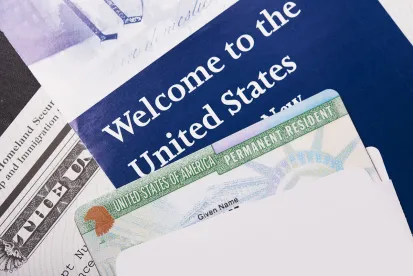After more than 18 months of travel restrictions and disruptions caused by the COVID-19 pandemic, the United States has substantially revised its approach and will no longer restrict entry into the United States based on geography. Effective November 8, 2021, the COVID-19-related travel bans have been replaced by vaccination and testing requirements without regard to physical presence in a particular region or country.
Despite these less restrictive entry requirements, international travel still poses risks. Due to the limited availability of visa appointments, we continue to advise caution regarding international travel for those who must apply for a visa before returning to the United States. Everyone considering international travel is urged to carefully consider the risks and be fully aware of how ongoing conditions may impact travel.
The official Presidential Proclamation making this change can be found here. This new Proclamation relies on U.S. Centers for Disease Control and Prevention (“CDC”) guidance for vaccination and negative testing criteria as referenced in the links below.
-
The CDC’s general page for COVID-19 exposure related to travel can be found here.
-
There is also a helpful CDC document with technical instructions to airlines that can be found here.
This new Proclamation revamps restrictions for “noncitizen nonimmigrant” international travelers entering the United States. Travel guidance is already in place for U.S. citizens and permanent residents and remains unchanged. The new policy replaces the country-specific travel bans with a policy that applies to virtually all nonimmigrant individuals, regardless of country of origin or physical presence. In exchange for country-specific bans, this new policy will be based on vaccination status and testing negative for COVID-19.
Vaccination Required for Nonimmigrant Travelers
Beginning November 8, 2021, all nonimmigrant travelers entering the U.S. must be fully vaccinated against COVID-19 in order to board U.S.–bound flights. In limited situations, unvaccinated nonimmigrant travelers may still enter the U.S., but they must meet certain exception criteria and comply with additional restrictions. The new Proclamation’s general rule is that unvaccinated nonimmigrants are not permitted to enter the U.S.
Vaccines accepted for travel to the U.S. are listed on the CDC website and currently include:
- Janssen/J&J
- Pfizer-BioNTech
- Moderna
- Pfizer-BioNTech
- Moderna
- AstraZeneca
- Covishield
- BIBP/Sinopharm
- Sinovac
The exceptions permitting unvaccinated nonimmigrants to enter the U.S. include the following groups:
- Persons on diplomatic or official foreign government travel
- Children under age 18
- Those with documented medical contraindications for receiving a vaccination;
- Participants in certain COVID-19 vaccine trials
- Those issued a humanitarian or emergency exception (This category must obtain approval from the U.S. Embassy or Consulate in advance of travel)
- Those entering on valid visas (other than visitors for business or tourism) from countries with limited vaccine availability
- Members of the U.S. Armed Forces and their spouses and children
- Crew members traveling by sea and certain air crew members
- Others whose entry is in the national interest of the U.S.
The vaccine-excepted categories are only those listed above. The prior exemptions to the geographic travel ban for certain family members of U.S. citizens and permanent residences, for instance, do not apply.
The CDC Technical Instructions provide details of the documentation required to demonstrate eligibility for each exception category. Those who travel by air to the United States under one of these exceptions will also be required to attest that they are excepted from the requirement to present proof of vaccination. Based on the category of the exception, they may further be required to attest that:
- They will be tested with a COVID-19viral test 3-5 days after arrival in the United States, unless they have documentation of having recovered from COVID-19 in the past 90 days;
- They will self-quarantine for a full 7 days, even if the test result to the post-arrival viral test is negative, unless they have documentation of having recovered from COVID-19 in the past 90 days; and
- They will self-isolate if the result of the post-arrival test is positive or if they develop COVID-19 symptoms.
Based on the category of the exception, those intending to stay in the United States for longer than 60 days may also be required to attest that:
- They agree to be vaccinated against COVID-19; and
- They have arranged to become fully vaccinated against COVID-19 within 60 days of arriving in the United States, or as soon thereafter as is medically appropriate, unless (for children) they are too young to be vaccinated.
The CDC website includes a helpful Travel Assessment that indicates travel requirements in response to individualized responses, which can be accessed here.
Negative COVID-19 Test Result Required for All Air Travelers
In addition to the vaccination requirements replacing the geographic restrictions, all international air passengers destined for the United States continue to be required to provide a negative COVID-19 test result in order to board U.S.–bound flights. As an alternative to a negative COVID-19 test result, international travelers may present documentation of recovery from COVID-19, including a positive viral test result within 90 days and letter from a health care provider or public health official clearing them for travel. All passengers must present the negative test result or proof of recovery from COVID-19 before boarding the flight.
For vaccinated travelers, the viral test must be on a specimen collected no more than 3 calendar days before the departure of the passenger’s U.S.–bound flight. Unvaccinated travelers must present a negative viral test result for a specimen collected no more than 1 calendar day before the departure of the passenger’s U.S.–bound flight. Note that parents traveling with children may have different testing timeline requirements based on differing vaccination status.
Testing requirements have been in place since January 2021, and apply to all air passengers traveling to the United States, 2 years of age or older, including U.S. citizens and legal permanent residents.
Reopening of Canada and Mexico Land Borders
Travel restrictions across the U.S. borders with Canada and Mexico, which barred U.S. entry of nonimmigrants for travel considered “non-essential,” are also being eased. Effective November 8, 2021, U.S. Customs and Border Protection (CBP) will begin allowing fully vaccinated travelers from Mexico or Canada to enter the United States at land and ferry ports of entry (POEs) for non-essential reasons. Travelers will be required to have appropriate paperwork that provides proof of vaccination. Individuals who have not been fully vaccinated for COVID-19 will not be allowed to travel for non-essential purposes from Canada and Mexico into the United States via land and ferry POEs. Entry into the U.S. on a work visa has generally been considered “essential” travel and has not been restricted.
Beginning in January 2022, all inbound foreign national travelers crossing into the U.S. from Canada or Mexico via land or ferry ports of entry — whether for essential or non-essential reasons — must be fully vaccinated for COVID-19 and provide proof of vaccination. This delayed implementation is intended to provide ample time for essential travelers such as truckers, students, and health care workers to get vaccinated.
There is no information suggesting that there will be any exceptions to the new vaccination requirements. However, note that this change applies only to entry through land or ferry ports. Air travel from Canada and Mexico would follow the vaccination guidelines for worldwide U.S.–bound air travel detailed above.
Visa Processing Remains Limited
The lifting of geographically focused travel restrictions will substantially ease international travel, but challenges will remain. For those who do not have a valid visa for return to the U.S., either because their status was changed in the U.S. or a prior visa has expired, obtaining a new visa may still prove difficult. Some consular posts are simply not scheduling routine visa appointments, and others are allowing appointments to be scheduled — sometimes months in the future — only to cancel them. From a practical standpoint, unless one is likely to qualify for an emergency or expedited visa appointment, there is a good chance that a new visa appointment will be difficult to schedule. Individuals eligible to have the in-person visa appointment waived stand the best chance of securing visas by submitting application documents to the U.S. Embassy through drop box or courier services. Each consular post determines the criteria for a waiver of the interview requirement. At a minimum, typically, the consular post requires that the individual have already been granted a visa in the same classification.
Those who need to obtain a new nonimmigrant visa should verify the status of visa processing operations at the consular post where they will apply.
Entry into the U.S.
In addition to the COVID-19 vaccination and test requirements, when entering the U.S. following international travel, foreign nationals should be prepared to answer questions from a Customs and Border Protection officer regarding the nature of proposed entry and qualifications for a designated waiver or exemption. All foreign nationals should carry documentation evidencing status as well as any documentation supporting the individual’s specific exemption from the vaccination requirement. Visit the Mintz Resources page here for details on required documents for travel.
Following entry into the U.S., it is critical for individuals to check the I-94 admission record to ensure that it properly reflects their status and authorized stay in the U.S. We recommend verifying the accuracy of Form I-94 details within 48 hours of entering the U.S. in order to correct any errors in a timely manner.





 />i
/>i

